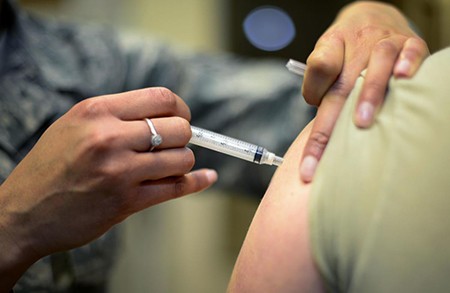Health experts in Colorado warn that contracting COVID-19 and influenza at the same time could lead to “more serious complications,” according to a press release last Thursday from the Colorado Department of Public Health and Environment (CDPHE).
Both the flu and COVID-19 are respiratory diseases, so they can both cause similar symptoms in the body–and when combined, many health experts speculate it could be a deadly storm.
Patients who have contracted COVID-19 and the flu at the same time are scarce, since the pandemic really arrived in the U.S. just as flu season began to wind down, Dr. Michael Matthay, professor of Medicine at the University of California San Francisco, told CNN.
So there’s not much concrete data on what a “twin-demic” will really look like.
However, knowing how each disease works gives medical experts a clue about how the flu and COVID could react when combined–and that risk is enough for the CDPHE to double down on flu vaccine education and administration statewide.
Dr. Purnima Madhivanan, an epidemiologist and professor at University of Arizona told Healthline that the flu and COVID-19 can both lead to pneumonia, but they damage the lung differently–while the flu leads to fluid buildup in the lungs, COVID causes blood clots in the lungs.
Both can cause respiratory failure, and experts hypothesize that the two combined could lead to respiratory failure more easily.
Dr. Michael Roizen, emeritus chief wellness officer of the Cleveland Clinic in Ohio, believes that catching both diseases at once puts you at higher risk for death.
“We don’t know how the two interact, but presumably if you get both at the same time, it would make it tougher to survive them… There would be a higher mortality rate than either of them alone,” Roizen said.
There’s a consensus among healthcare professionals that people can get more than one viral illness at once, and being sick with two viruses makes it harder for your body to battle them.
According to Dr. Lisa Maragakis, senior director of infection prevention at John Hopkins University, this means you can experience worse complications, more lung damage, and even death. It is safe to assume that 1) having one of the viruses will make it more difficult for your body to fight the other, and 2) having inflamed lungs from either or both illnesses makes it easier for bacteria to enter and cause complications.
The flu vaccine is never completely effective, since the vaccine is developed months before flu season hits the northern hemisphere. However, it’s still important in drastically reducing influenza cases–and even if you do catch the flu, a flu vaccine could mitigate the symptoms and severity of the illness.
In Denver, efforts to provide the flu vaccine to populations that are at higher risk for catching the flu (and coronavirus) are underway.
Dr. Judith Shlay, associate director of Denver Public Health, told NPR that Denver will send strike teams into schools, use Parks and Rec centers to set up pop-up flu clinics, and partner with shelters to administer flu vaccines.
Flu and COVID-19 Could Overload Hosptials
In addition to the risk of catching both diseases at once, the CDPHE warns that a flu surge could greatly overload the health care system with both flu and COVID patients having to be hospitalized at the same time.
“We barely have the hospital capacity for one,” Roizen said. “During a season like 2018, we filled up the entire hospital and had to decrease elective procedures during that time… If you then put on top of that another disease, that would overwhelm us.”
Like COVID-19, the flu can be passed along to high-risk individuals, even if an infected person is only experiencing a fever and some body aches. High-risk populations include the elderly, young children, pregnant women, and people with chronic health conditions.
More than 3,500 Coloradans were hospitalized last year due to the flu, according to the CDPHE.
Flu vaccines in Colorado are free under most insurances, including Medicare, Medicaid, and CHP+. Even if you don’t have insurance, however, you can still get a flu shot for free at certain clinics across the state.
Coloradans can now take advantage of Fluvaxcolorado.org to learn more about the flu and to find a provider to receive a flu shot–even without insurance.




